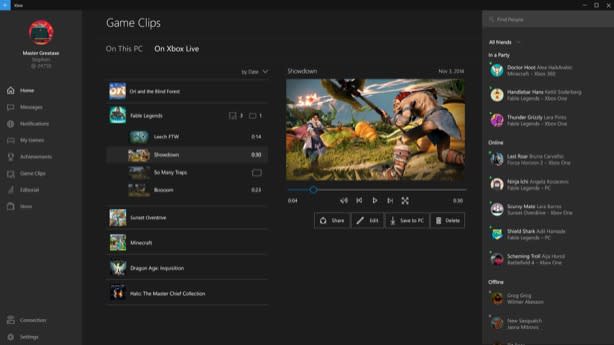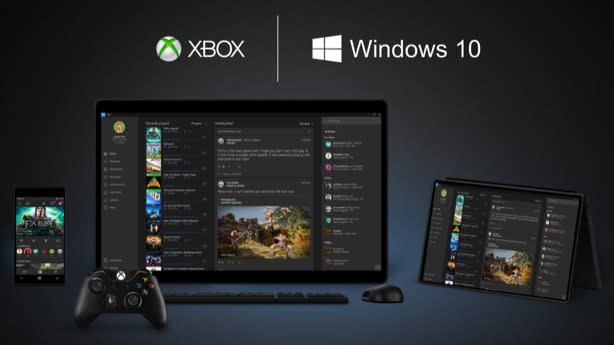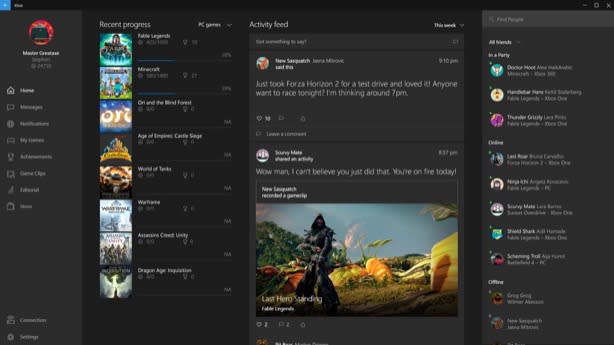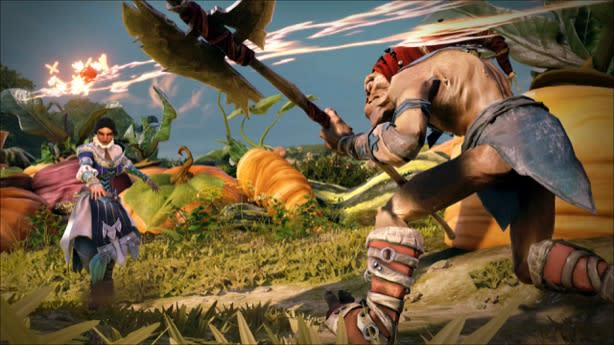Fable just the first step in getting more Xbox One games on Windows
It's easy to forget the Xbox's place inside the Windows empire. The bespoke platform is hinged on games and entertainment, looming over the console world but still living in its own fiefdom under Microsoft. The Xbox 360 and Xbox One are seen as instrumental to the software giant's goals, but their reach is about a billion behind that of Windows. Microsoft wants to dismantle the barriers within itself now, unifying games, productivity and phones under the banner of Windows 10.
The Xbox One will host new universal apps – programs designed to run on both Windows devices and Xbox architecture – alongside a Windows 10 update later this year, but that's a lesser gesture compared to what Microsoft announced on Wednesday during its Windows 10 event. Even having the Xbox and its games there, on stage, represents a change in the Windows message.
Head of Xbox, Phil Spencer, took that stage to announce a PC version of Fable Legends, the latest entry in developer Lionhead's long-running and lovably lighthearted fantasy role-playing series. Not only is the game coming to Windows PC players, but it's coming in a way that allows them to play and chat with Xbox One players through Xbox Live. According to Spencer, it's the first game of several first-party Xbox games coming to PC.

This isn't the first round of cross-platform play for Microsoft, which released Shadowrun for Windows Vista and the Xbox 360 back in 2007. That game backfired for many, many reasons ("This is Shadowrun?" people asked), with its cross-platform play received mainly as a novelty. It was also fiercely oppositional, whereas Fable Legends has magic-imbued heroes teaming up to defeat a devious dungeon master (also controlled by a connected player). Spencer suggests that when fierce competition gives way to more relaxed camaraderie, there's less likely to be granular debate over keyboards and controllers and K/D ratios – people are just happy to play with each other, without asking, "Which version did you buy?"
The quality of Fable's cross-play has yet to be tested (never mind the quality of the game itself), and Spencer is hesitant to pull hard-and-fast future rules from it. Will you ever get both versions of the game just by buying one? Maybe. Will third-party partners, like Crystal Dynamics and Rise of the Tomb Raider, follow suit? That depends on the deal. Will all Microsoft Studios games come to PC and Xbox? Microsoft isn't committing to that. The company hasn't announced PC versions of Forza Motorsport 6 or Halo 5, for instance, but it's now more likely to do so than ever before.

From the perspective of someone looking to choose the right console, this could be seen as a weakening of Xbox's position. Games like Fable Legends (and even games like Dead Rising 3 before it) are no longer "exclusive" in the same way, making the PC a viable substitute for someone intrigued by Microsoft's own lineup. It weakens the Xbox sales pitch.
Spencer frames this argument in a larger picture, however: Microsoft wants Windows 10 to be successful and loved. For that to happen, it needs to excel on all fronts, including its push to become the de facto operating system for PC games. The Xbox is a gaming platform in itself, with enough partnerships, expertise and creative studios to bring a shared sort of 'exclusivity' to all of Microsoft's leading platforms. Doing so beneath the specter of Games for Windows, a failed attempt to graft the Xbox to a download service on PC, should also provide some guidance on what not to do.
"The fundamental answer to me – and this is probably more for us, and people can take a wait and see attitude – the Xbox team believes gaming on Windows 10 is critical to our long term success," Spencer says. "I look at what some of the other companies do out there in terms of creating other devices and trying to link those things together. I fundamentally think the fact that Xbox and Windows live inside this company should be an advantage for people who are either Windows gamers or Xbox gamers or both. I think we're going to be able to land that."

This proposed openness within Microsoft seems to be reflected in the Windows 10 Xbox app. Yes, it displays the gaming activity and videos of your Xbox friends, streams Xbox One games to local Windows devices, assembles all of your achievements (in a more orderly interface than on the Xbox itself) and facilitates cross-platform invites. It's also aware enough to launch your Steam games and record game clips from any Windows game, not just those coming from Xbox.
If Microsoft is keen to co-exist with Valve in the area of PC games, the audience might have more to gain than just the opportunity to play more flagship console games like Forza, Halo or Sunset Overdrive. The speculative hope is that Xbox approaches its role in Windows as it does in its own domain – with the aim of presenting cross-platform games in the best possible way in high-quality console-to-PC ports. Players on PC are sadly too used to console games coming to PC haggardly, stripped of options and optimization.
If that's the case, Spencer doesn't see it as coming at a cost to the invested Xbox owner. "I want to make the fact that I'm an Xbox customer mean that I can move between the content and my friends list fairly seamlessly whether I'm on PC or I'm on Xbox One," Spencer says. "I don't feel like there's some kind of financial motivation to keep things off of PC; at the Microsoft level clearly that's not true. And on the Xbox side, I want Xbox gamers to be proud that Windows is a Microsoft product and Xbox is a Microsoft product. And so I think we'll be able to thread the needle and do both."

